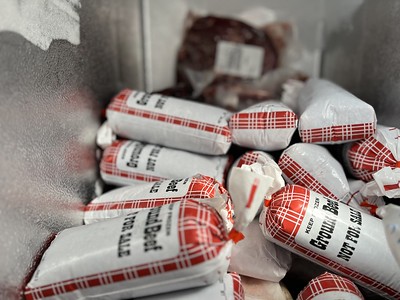Feb. 3, 2023
How to keep your food safe during a power outage
By John Lovett
University of Arkansas System Division of Agriculture
Arkansas Agricultural Experiment Station
Fast facts
- Power outages affected 72,000 Arkansans this week
- Perishable foods can remain safe only four hours in refrigerator after power lost
- Foods can be transferred to freezer to stay safe longer during power outage
- “Danger zone” for food is between 40- and 140-degrees Fahrenheit
(585 words)
FAYETTEVILLE, Ark. — Food safety is on the minds of many Arkansans this week, with over 72,000 customers losing power during the icy weather.
The food safety clock is ticking on their food in fridges and freezers. For many, it may already be too late to save. Perishable foods with temperatures above 40 degrees or below 140 degrees are in what food scientists call the “danger zone,” where pathogens like Listeria and Staphylococcus multiply rapidly.
There were more than 52,000 customers still without power in Arkansas Friday morning, according to PowerOutage.us, with most of those being in Jefferson County. Entergy, a primary provider in Arkansas, showed no electrical power with 33,321 customers at noon Friday. Brandi Hinkle, an Entergy spokesperson, said 2,800 crew members were working to restore power and they expected most of their customers to be reconnected by 10 p.m. Friday.
“There are serious consequences to your health if you eat contaminated food,” said Philip Crandall, professor of retail food safety for the Arkansas Agricultural Experiment Station. “Follow the precautionary principle. When in doubt, throw it out.”
Food should not be tasted to determine its safety, he added.
Listeria monocytogenes has a mortality rate of 16 percent, and Staphylococcus aureus produces a toxin that typical cooking temperatures do not destroy, Crandall said.
“Once staph grows and produces its toxin in food, you could boil it for 30 minutes and still get sick if you eat it,” Crandall said.
Crandall said Listeria monocytogenes could grow to an infective dose at refrigerated temperatures, albeit slowly, and is particularly deadly to very young children and senior citizens.
After the power is out, most refrigerators will keep food safe for up to four hours. If the door remains closed, foods in a full freezer will stay safe for up to 48 hours or 24 hours in a half-full freezer after losing power. According to this Arkansas Emergency Preparedness Resources website, transferring perishable foods from the fridge to the freezer is one option to keep them below 40 degrees longer.
Dry ice or block ice may also be used to keep temps down in a freezer. Fifty pounds of dry ice should hold an 18-cubic-foot freezer for two days. Remember, do not touch dry ice with bare hands or place it in direct contact with food.
Crandall recommends monitoring temps with an appliance thermometer placed inside the freezer or fridge.
An ice chest may also keep foods safe if there are enough ice or gel packs to keep the food at or below 40 degrees.
Crandall said that being prepared to save the food before it becomes a food safety issue is the best course of action. Having a source of back-up power to operate freezers and fridges is optimal. If the temperature outside is below freezing, it may also be stored outside in a location protected from pests until power is restored.
Download the fact sheet Planning for Food After a Disaster for additional information on food handling.
Crandall is also part of the Center for Food Safety at the experiment station, the research arm of the University of Arkansas System Division of Agriculture. The Center for Food Safety's mission is to discover practical, evidence-based solutions to food safety issues within Arkansas and beyond through research, innovation and collaboration between the public and private sectors.
For more information on food health safety, contact your local Cooperative Extension Service agent. The extension service’s health specialist is Bryan Madder, and the nutrition specialists are Josh Phelps and Christine Sasse.
FoodSafety.gov also offers a guide to evaluate what foods may be kept or thrown out after a power outage.
To learn more about Division of Agriculture research, visit the Arkansas Agricultural Experiment Station website: https://aaes.uada.edu. Follow on Twitter at @ArkAgResearch. To learn more about the Division of Agriculture, visit https://uada.edu/. Follow us on Twitter at @AgInArk. To learn about extension programs in Arkansas, contact your local Cooperative Extension Service agent or visit www.uaex.uada.edu.
About the Division of Agriculture
The University of Arkansas System Division of Agriculture’s mission is to strengthen agriculture, communities, and families by connecting trusted research to the adoption of best practices. Through the Agricultural Experiment Station and the Cooperative Extension Service, the Division of Agriculture conducts research and extension work within the nation’s historic land grant education system.
The Division of Agriculture is one of 20 entities within the University of Arkansas System. It has offices in all 75 counties in Arkansas and faculty on five system campuses.
Pursuant to 7 CFR § 15.3, the University of Arkansas System Division of Agriculture offers all its Extension and Research programs and services (including employment) without regard to race, color, sex, national origin, religion, age, disability, marital or veteran status, genetic information, sexual preference, pregnancy or any other legally protected status, and is an equal opportunity institution.
# # #
Media Contact: John Lovett
U of A System Division of Agriculture
Arkansas Agricultural Experiment Station
(479) 763-5929
jlovett@uada.edu
